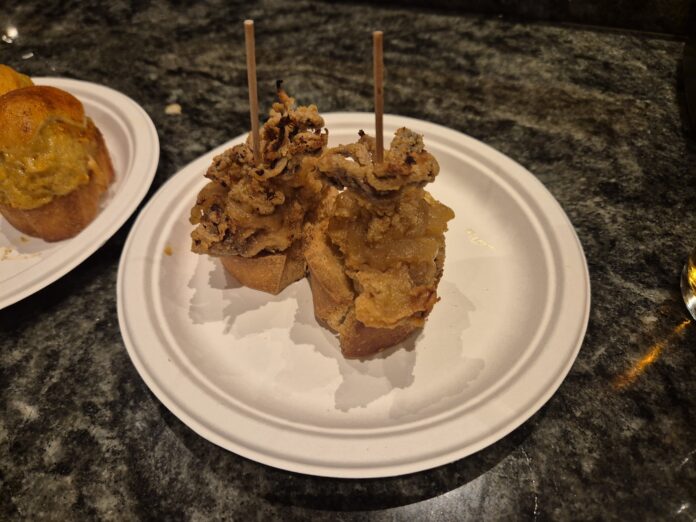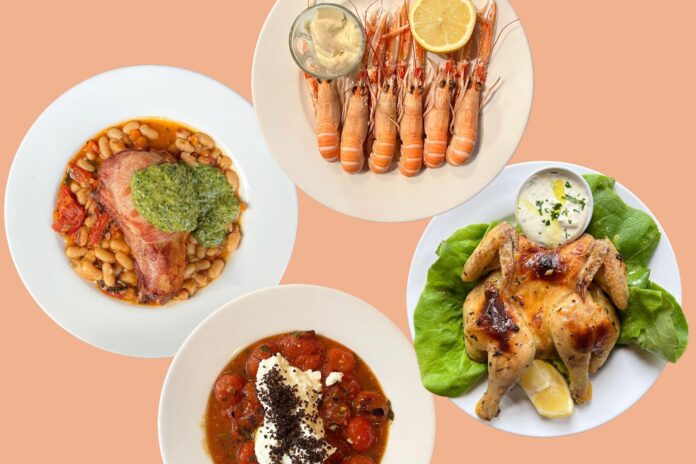Phew. Do you think it’s safe to declare that the worst of the winter weather is behind us now? With the Met Office predicting sparkling Easter sunshine, barbecues which haven’t seen nearly enough action during a dreary March (try saying that after a few cans) are getting dusted off, cleaned down and prepared for a month of spring-time grilling, and we can’t wait.
We’ll pass on the burgers, sausages and floury baps this time. For us, there’s nothing better than setting up a barbeque on the beach and grilling a whole fish to perfection, so the skin is blistered and smoky, and the flesh inside flaking and moist.
They say place, time, set and setting all affect flavour so much, and a grilled whole fish on the barbeque, on the beach, feels like the aptest realisation of this idea. Such a technique requires minimal effort and minimal accompaniment; just a squeeze of lemon and a sprinkle of salt and we’re happy.
That said, so many Brits are a little tentative about barbequing whole fish, fearing over or undercooking it, leaving half of the skin and all of the flesh on the grill, or, heaven forbid, getting a few bones stuck in the ol’ teeth. It’s time to raise our BBQ game, and really, it couldn’t be easier. We’re here to reassure you with these tips; here’s how to grill a whole fish on the BBQ in 6 simple steps.
Why Cook Fish Whole?
First, why grilled whole fish on the barbeque, and not fillets? Well, first and foremost, we’re prioritising flavour here, and cooking fish whole reliably tastes fantastic, as the bones contribute huge amounts of flavour to the final product.
What’s more, grilling a whole fish is far more forgiving than fillets; the high, temperamental heat of the barbeque or an indoor grill can eviscerate fish fillets in seconds, but fish bones add succulence, structure and protection against the open flame’s unpredictability. Put simply, it’s pretty hard to overcook a fish when it’s whole, unless you seriously take your eye off the ball and onto the rosé.
Finally, a whole grilled fish makes for such a gorgeous centrepiece for an outdoor feast; dramatic, enticing and adding that sense of occasion that any great barbeque should boast.
It also rhymes with ‘Sole’ – a great grilling fish – and ‘coal’. So, that’s settled, then; whole it is.
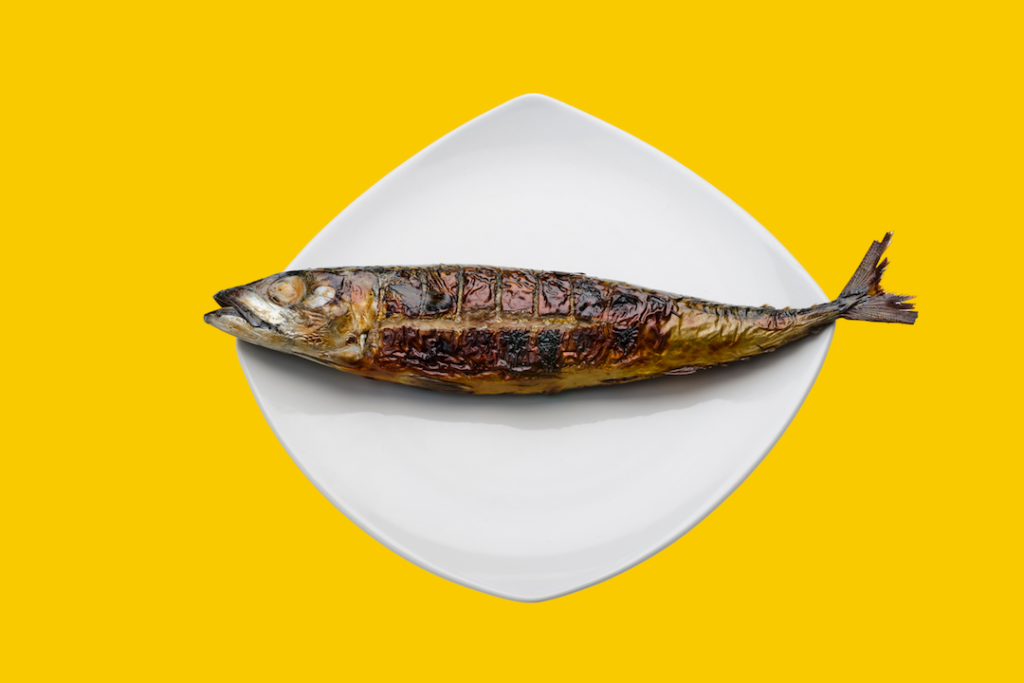
Catch Of The Day
So, what fish works best on the barbeque, you ask? Well, firstly, let’s go for something seasonal, which is better for reasons of both sustainability – it’s better to eat fish when it’s abundant to avoid depleting stock levels, and not in their particular species’ breeding or spawning season – and of flavour. Always look for fish which has been line caught and MSC certified, a marker of sustainable fishing practices in this country.
In April, in season and ideal for grilling, brill and turbot are particularly good, as is monkfish (a whole tail works so well), bream, mackerel, sardines, and lemon and megrim sole. We particularly love oily fish on the barbecue, as the skin seems to blister and bubble just so, lending the whole affair that smoky flavour we’re coveting. Mackerel and sardines, especially, seem to respond so well to the grill.
As always when buying fish, ensure that you’re getting the freshest you can find. Buying from a fishmonger is always preferable to those found on ice in the supermarket, as you’ll be supporting smaller, often family-run operations, the quality and treatment of the product is usually better, and the fishmonger will have a huge wealth of knowledge on what’s good right now, if only you ask.
You can check if your fish is fresh by looking it straight in the eye; their peepers should be bulging, not sunken, and clear and shiny, not milky or bloody. Fresh fish should smell of the sea, and not at all fishy, and its skin should be glistening and vibrant (older fish looks dull and brown), with no visible damage or blemishes. Finally, your fish’s gills should be bright red.
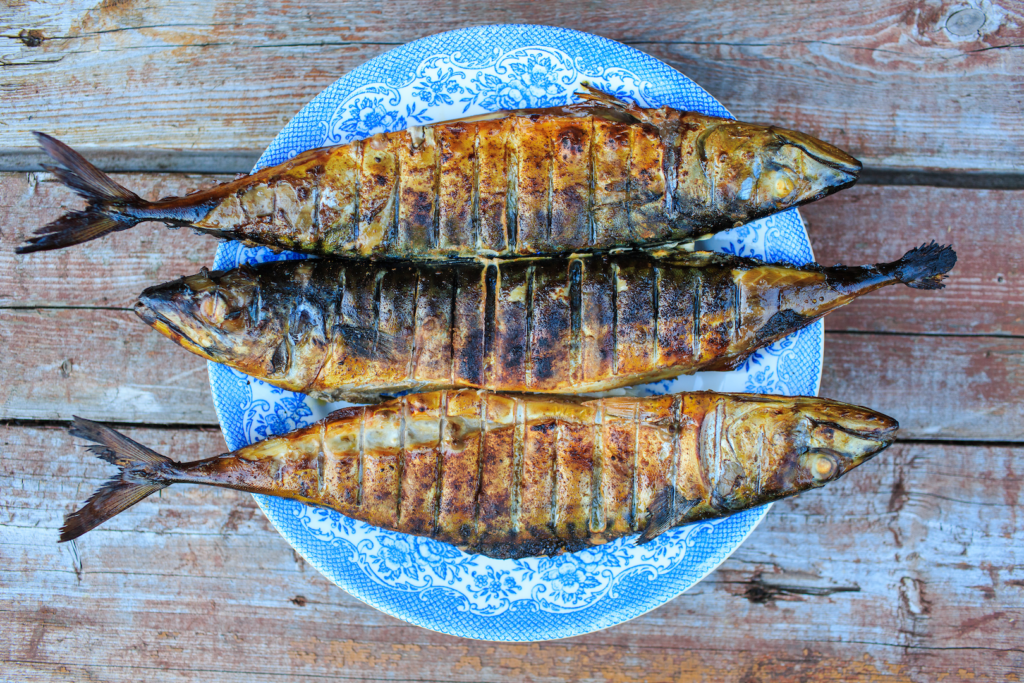
Preparing Your Fish Your Grilling
To prepare your fish for grilling, the work starts at the fishmonger. Ask your fishmonger to do the hard work for you and clean the fish for grilling; this means gutting and scaling it. We prefer if the head is kept on; better for presentation purposes, we think, and there are some tasty morsels of flesh lurking in there, too. Personally, we don’t score our fish for grilling; it tends to dry it out more, and prematurely releases some of the juices which we’d love to keep in.
Though there’s so much to be said for the simplicity of a whole grilled fish, unadulterated except for a few flakes of salt, there are ways you can impart flavour beforehand if you so wish. Why not try a spice rub, as you would with meat, of toasted fennel, cumin and coriander seeds? Or, marinate the fish with olive oil, (just a little) salt and pepper, and garlic for an hour or two before grilling. Be careful not to introduce citrus too early, or overdo the salt, or you’ll cure the fish.
If you’re using round fish (like mackerel or seabass), then consider stuffing the cavity with sliced onion, fennel and lemon to impart flavour and intrigue to the inner flesh. Or, why not take inspiration from Thailand, and stuff your fish’s belly with bruised lemongrass and makrut lime leaf? This adds a delicious aroma to the flesh, and the smoke coming off the barbie.
Finally, if you’re looking for a really interesting fish prep method which keeps the skin super moist, you could cover your fish in a salt crust prior to grilling. Simply coat the skin completely in a little water or beaten egg white an hour or so before you intend to cook it, and apply coarse sea salt all over. Allow to firm up in the fridge before grilling.
Whichever way you’re doing things, do remember to salt liberally a few moments before grilling, and add a few flakes after it’s cooked, too.
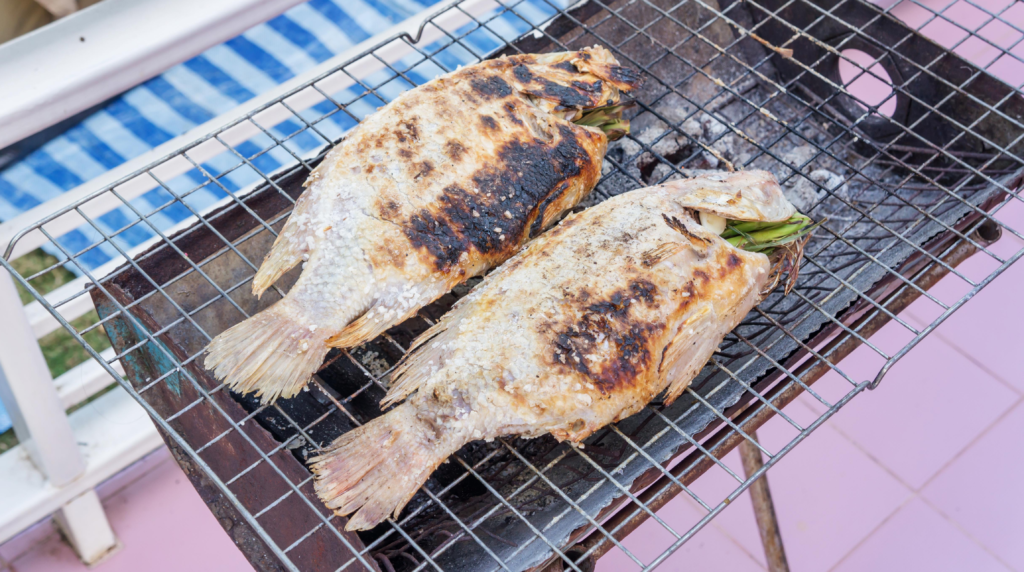
How To Prevent Your Fish From Sticking To The Grill
So many keen grillers steer clear of barbequing whole fish because of its tendency to stick to the grill bars. And yep, this does happen to the best of us from time to time.
But if you’re wondering how to prevent your fish from sticking to the grill, the answer is all in the heat. Sure, you could wrap your whole fish in foil before barbequing, but that rather defeats the point, don’t you think? We want the flavour of coals or wood here!
Instead, just ensure your coals (and grill) are both super clean and super hot. In general, it’s best to clean your grill when it’s hot, as the grease and debris scrape off with ease; simply skewer half an onion with a fork and use this makeshift device to rub at the grill until it’s shiny.
Next, the coals need to be white-hot and glowing (after the flames have died down), and the grill itself needs to be super hot, too. You should only be able to hold your hand over the barbeque grill for a second; yep, we want it that hot.
Then, brush the fish skin and grill bars with a little oil just before you place it on the barbeque. By ensuring the coals are glowing (but not flaming) and the grill scrupulously clean and hot, you’ll prevent your fish sticking to the barbeque.
Better yet, if you’re planning on doing this thing a few times, invest in a specially designed fish basket (sometimes called a clamp), which gives you more control of turning the fish, and prevents it sticking. This also allows you to grill at a lower heat without fear of the fish sticking. Sometimes, a slow-grilled fish can be totally delicious, too.
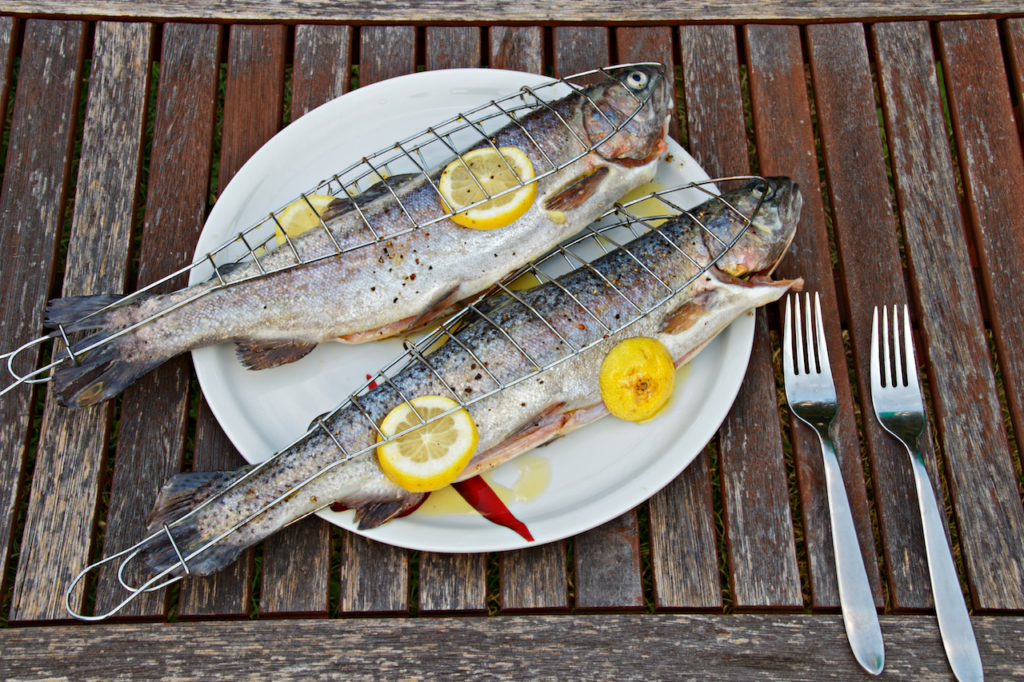
How To Tell If Your Whole Grilled Fish Is Done
Depending on the size of your fish, it may only need a couple of minutes on either side – for red mullet and smaller mackerel – or perhaps nearer 15 minutes in total for a whole sea bass. There’s no one correct timing or catch-all rule here, as fish varies in size and plumpness enormously. Instead, use your intuition to tell when it’s done; once the skin starts crisping up, it’s likely the flesh is cooked, too. Remember, this cooking-fish-whole thing is pretty forgiving.
Alternatively, take a knife and check in the fattest, fleshiest part of the fish. Gently pull back the skin; the flesh should have turned from translucent to opaque, and should easily flake. If you’re being extra scrupulous, a meat thermometer should read 63°C at the thickest part.
Allow to rest for a couple of minutes before everyone tucks in for the juiciest results!
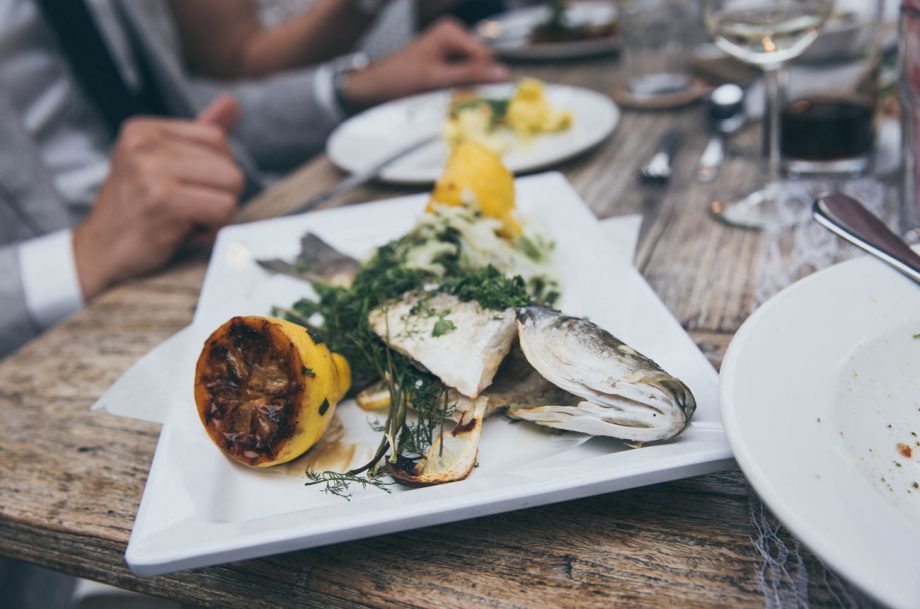
What To Eat With A Whole Grilled Fish
As we mentioned, when whole grilled fish is this good, and the flavour of the coals imparted, you want to keep things really simple elsewhere to let the fish shine.
Grilled or boiled seasonal spring vegetables are the natural accompaniment here. In April, asparagus and spring onions are abundant and respond to the barbecue incredibly amiably. Simply brush them with olive oil prior to grilling; make sure you take them far enough on the barbecue to achieve those all-important grill marks; just delicious!
Or, some parboiled new potatoes, kissed with coals before serving, work so well with fish, too. We also adore pickled rhubarb or a rhubarb chutney with oily fish; so perfect at this time of year.
A squeeze of lemon and sprinkle of salt is all you need here, but we certainly won’t say no to some sauces either. We particularly love a salsa verde using fresh, seasonal green herbs and loads of anchovies and capers with whole grilled fish, particularly the oily kind. Equally, a homemade tartare sauce with flakes of smoky grilled fish is spring on a plate to us. We’d serve the latter with plaice, turbot or sole especially.
Anyway, all this chat has made us hungry; we’re off to the fishmongers. Good luck with your grilling and we hope our invite’s in the post!


